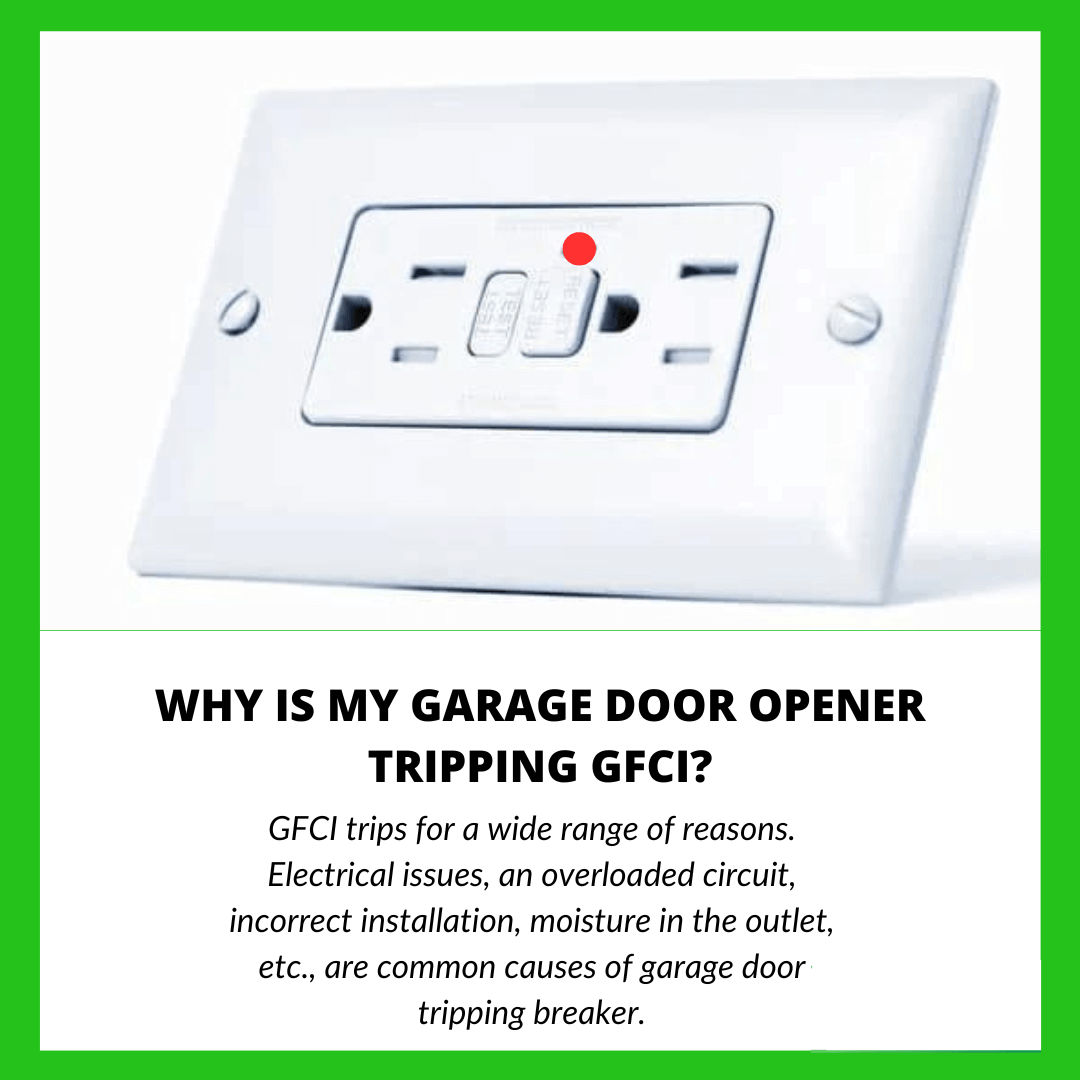Installing GFCI (Ground Fault Circuit Interrupter) outlets and breakers for your garage door opener are crucial. They create an extra layer of protection for your garage opener’s electrical system. But they can be incredibly inconvenient for continuous garage door opener tripping GFCI.
GFCI trips for a wide range of reasons. Electrical issues, an overloaded circuit, incorrect installation, moisture in the outlet, etc., are common causes of garage door tripping breaker.
It is important to know the root cause to solve the problem and let the garage door opener work properly. Let’s get going.
Why is the Garage Door Opener Tripping GFCI?
Garage door opener GFCI trips for some specific reasons. Here are the most common causes described, along with the solutions.
Moisture or Water in the Receptacle Box or Outlet
The prime reason for tripping GFCI is the water or moisture in the outlet or receptacle box. Undoubtedly, water is dangerous around electricity. If you live in a moist or rainy area and install a GFCI outlet for powering your garage door opener, the GFCI can come in contact with moisture or water.
Moisture can develop in an outlet box because of a physical splash of water. However, humidity can accumulate inside an outlet if the GFCI is installed in a highly humid area like Florida. Finally, the GFCI trips.
In order to prevent such an issue, install a GFCI box with additional protection. The good news is advanced GFCI boxes are engineered with waterproof coating. These boxes can resist humidity, rain, moisture, or even flooding.
If you are experiencing constant garage door opener GFCI tripping problems, install advanced boxes instead of a normal GFCI outlet.
An Overloaded Circuit
GFCI trips continuously for an overloaded circuit also. If you don’t know what an overloaded circuit is.
When you need to consider its maximum capacity before attaching too many electrical appliances to a similar circuit, the circuit becomes overloaded. A GFCI outlet can handle much power based on the size of the electrical wiring.
A short circuit can happen in an overloaded circuit because of exposed or faulty electrical wiring. GFCI receptacle or breaker power electrical wires. When the wires touch each other, the GFCI circuit trips.
In this case, it would be best to unplug all the electrical devices from the GFCI outlet if you are sure that overload is a concern.
Then plug the garage door opener and other devices one by one. Check whether GFCI tripping occurs. If you experience tripping issues, ensure the GFCI circuit is overloaded.
A Ground-fault Occurrence
A ground fault happens if the heated wire gets connected to the grounded wire. It occurs for many things.
- Weary Insulation
Garage door openers’ older electrical wiring is the main cause of weary insulation. If the insulation wears down badly, the heated wire touches the ground wire, causing a ground fault.
- Rusty or Pinched Wires
The same happens when the wire becomes corroded, rusty, or pinched.
- Loose Connections
Arching happens because of loose neutral or heated wire connections, leading to GFCI tripping.
Loose connections can be found in the GFCI outlet, circuit breaker, branch circuit or anywhere in the garage door opener electrical wires.
- Damaged Electrical Devices
Some electrical devices can damage quickly. Such an appliance is a hair dryer. The motor of a hair dryer can damage quickly, and electricity leakage occurs. Finally, it trips a GFCI.
- Conductive Dust
GFCI outlet boxes can be filled with conductive dust and debris. As a result, it can leak current from the heated wire to the ground.
Damaged GFCI Outlet
Like all other electrical components, GFCI outlets also wear and tear over time. Generally, a GFCI outlet lasts 20 – 25 years, based on how the circuit is installed.
A damaged GFCI outlet will trip without any possible reason as it will be unable to handle the required electricity of a garage door opener.
Check the GFCI outlet once a month. You can do it yourself by pressing the PUSH button available on the face of the outlet.
The circuit will work perfectly if the outlet trips once you push the button. Remember to press the reset button after completing the test.
Incorrect Installation
Installation of the garage door GFCI outlet is of utmost importance. Whether you or a professional electrician installs the GFCI outlet, if it is installed incorrectly, the GFCI outlet will surely trip.
Correct wiring of the GFCI is crucial. Wrong wiring will cause constant tripping to your garage door opener GFCI. Even the GFCI may not work, and replacement is mandatory.
Nuisance Trips from Freezer or Refrigerator
A freezer or refrigerator is often stored in a garage. Also, people plug the garage door opener and freezer in the same GFCI outlet. When it happens, the GFCI might trip.
In such a situation, plug the refrigerator into a separate GFCI circuit. This will help you solve the garage door opener GFCI tripping problem.
FAQ
Should a garage door opener be on a GFCI?
Yes, the garage door opener should have GFCI protection. GFCI circuits are much more efficient in detecting tiny leaks between neutral and heated wires. Also, it prevents electrical shocks by monitoring the electricity flow. More importantly, GFCI prevents damage to different household electrical equipment.
What size breaker do I need for a garage door opener?
Before installing a GFCI for your garage door opener, you will need to know the building codes. If your state or city doesn’t maintain any standards for GFCI circuits, I recommend using 15 AMP GFCI for a single garage door opener. On the other hand, a dedicated GFCI of 20 AMP for 2 – 3 openers will be an ideal choice. Also, remember to install a surge protector to protect the power surges.
Do garage door openers use a lot of electricity?
Usually, garage door openers don’t use a lot of electricity. They only work for a couple of minutes a day. That is why they consume little amount of electricity while opening and closing.
Will a surge protector stop a GFCI from tripping?
The truth is a surge protector cannot stop a GFCI from tripping. GFCI usually trips for different reasons, including incorrect installation, damaged GFCI outlet, a ground-fault occurrence, or accumulation of water or moisture in the outlet. Solving these issues will help you to stop tripping GFCI.
Is it safe to leave a GFCI tripped?
No, a tripped GFCI is not safe at all. It can damage your garage door opener and other electrical appliances if a GFCI tripping issue is overlooked for many days. So, whenever you experience tripping GFCI problems, call a professional electrician on time.
Final Words
A garage door opener tripping GFCI problem should be considered a safety measure. Usually, garage door opener GFCI doesn’t trip without reason.
By reading this guide, you already know the reasons for tripping GFCI. Consult a professional electrician to identify the problem. Avoid trying to handle this issue yourself if you lack the skills to handle electricity problems.
If the GFCI circuit requires replacement, don’t hesitate to do so. Keeping your home’s different electrical devices safe to use is vital.




